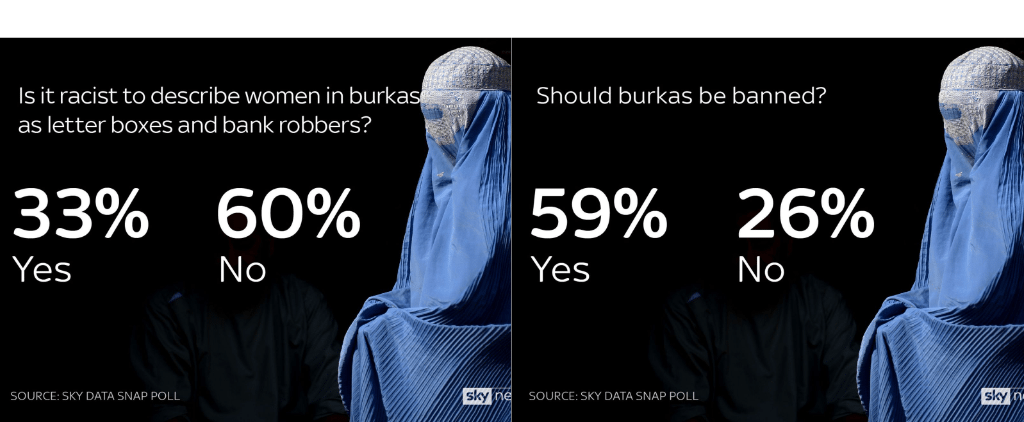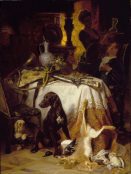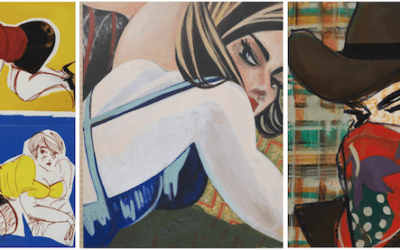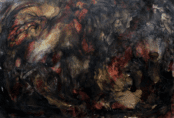Sky News Poll
[dropcap style=”font-size:100px;color:#992211;]B[/dropcap]oris Johnson’s latest contrarian contribution pulls out of focus some features of our modern democracy. And whilst his popularity is on the rise, within the Tory right, his credentials for being PM are surely damaged. (Former Attorney General, Dominic Grieve, is reported to have said he will leave the party, should Johnson become leader.)

Muslim Women of the Veil
Wit and repartee call upon a special faculty. We are charmed by wit, enchanted by repartee. To be enchanted is to have a spell cast over us. (The Latin canto is translated either as ‘I sing’ or as ‘I pray’.)
German philosopher, Immanuel Kant, thinks that genius is the ability to produce aesthetic ideas. Aesthetic ideas are ideas to which no concept is adequate. The genius does not know how the work achieves its special quality. (It is as if nature speaks through the artist.) We cannot simply spell out what works of art mean. It is the mark of an aesthetic idea that it ‘quickens the mind’. We are enlivened by an aesthetic idea, even though, in colloquial terms, we cannot quite put our finger on it.
The work is original. It is not the result of any rule. The work of art just pops up, effortlessly – something out of nothing, sui generis. The work of genius itself provides the rule for others (non-geniuses) to follow.

Men of the Mask
Other artists, those not blessed with genius, follow these rules but in so doing they will never achieve the status of genius. Their products, like those of craftsmen, might well be enjoyed by many, but they are nevertheless short of the mark of genius. Talentless.
Is it not the same with wit and repartee? The boisterous soul, quick of mind and versed in figurative speech, able, always, to drop in an allusion to classical antiquity; able, always, to say exactly what we wanted to say but couldn’t. The wit says the unsayable in two senses. He says what we would have, in retrospect, like to have said; and he says that which no one would have the confidence to say, given that in saying it, he gives voice to an ‘idea’ that we instantly recognise and yet would have had the greatest difficulty in explaining. That is why the wit is ‘quick’.
Boris Johnson is fast and funny; Wodehousean and crumpled-up-toffish. He’s like a dear old naughty uncle who says those things that make our mothers tut or blush. He’s a lovable old rogue.
Moreover, he talks about things topical – the irritating things we don’t quite know what to think about; things that hover, like fruit flies, at the edges of our minds; and, quickened by his wit, we are led to lively debate. His vivid imagery collects us to laugh complicitly, to be included in the group having fun at the bar; or else to take offence and be excluded from the bright sparks, reduced to the ranks of dullards who mope around in sullen mood with glasses, half-empty.

Yet his defenders are diverse. The Times this morning has a letter by Dr Taj Hargey, Imam for the Oxford Islamic Congregation. The Imam opines that Johnson should not apologise for telling the truth. Hargey tells us,
[Johnson’s] evocative analogy is unfortunate but he is justified in reminding everyone that the Wahhabi/Salafi-inspired fad of facial masking has no Koranic legitimacy. It is, however, a nefarious component of a trendy gateway theology for religious extremism and militant Islam.
The burka and niqab are hideous tribal ninja-like garments that are pre-Islamic, non-Koranic and therefore un-Muslim.
He ends his letter,
If Britain is to become a fully integrated society then it is incumbent that cultural practices, personal preferences and communal customs that aggravate social division should be firmly resisted. For this reason Britain must emulate France, Belgium, Austria, Bulgaria and Denmark in banning the Burka. (Hagley 2018)
We might, nevertheless, worry about the bearing of Johnson’s jollity upon the lives of those whose faces are hidden by the burka, and upon those who love them.
Upon the victory of the Leave campaign in the 2016 referendum, Pakistanis in Manchester were harangued in the streets, uneducated supremacists called after them, ‘What are you still doing here? We voted for you to leave’
The stupidity of such a remark is part of its threat. Those in the scrummage at the bar surrounding the man of quick wit will suck it all up and believe, in their heart of hearts, that it is as much their wit as his. And when they repeat the half-remembered lines, others yet dimmer, will suck it all up again, and go on to repeat it down the line.
Drunken fools will think it funny to pretend to post pizza flyers or adverts for gymnasia membership into the slots that Boris has likened to letter-boxes; or they will adopt poses mimicking armed police thwarting bank-robbers. Muslim women of the veil will have become ‘a laugh’. And in so becoming they, and those close to them, will have been marginalised yet further.
Is the learned Imam correct in claiming that what Johnson has said is not, in and of itself, racist? If it remains a source of tribal hostility to a specific people, then it should not be condoned.
More worrying still, is the idea, in general, that wit should be used so forcefully to divide people. Even if there was no conscious intent, Johnson should recognise that such flippancy is little more than playground bullying.
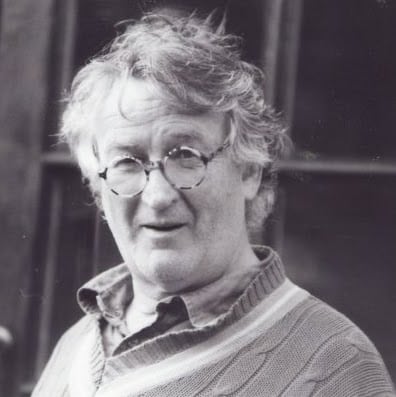
Ed studied painting at the Slade School of Fine Art and later wrote his PhD in Philosophy at UCL. He has written extensively on the visual arts and is presently writing a book on everyday aesthetics. He is an elected member of the International Association of Art Critics (AICA). He taught at University of Westminster and at University of Kent and he continues to make art.

